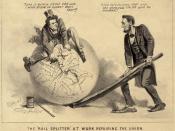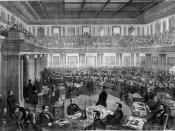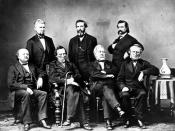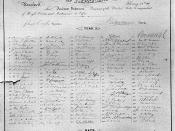Andrew Johnson was the only President ever to be impeached. Johnson saved the presidency from complete legislative restriction. When the Civil War ended, Johnson inherited the wartime dispute between Lincoln and Congress over how to treat the South after the war. This disagreement soon intensified, as more and more Republicans in Congress came to oppose Johnson's views. Congress enacted its policies in spite of his repeated vetoes. The division became so wide that the United States House of Representatives voted to impeach him.
Impeachment had long been a goal of the Radicals. On Feb. 24, 1868, the House of Representatives voted 126 to 47 to impeach Johnson. On March 2 and March 3, the House adopted 11 articles of impeachment. The most important articles were the first, which charged that the President had violated the Tenure of Office Act by dismissing Stanton, and the 11th, which claimed that he had conspired against Congress and the Constitution.
This charge cited Johnson's claim that Congress did not properly represent all the states.
On March 5, 1868, the Senate organized itself as a court to hear the impeachment. Chief Justice Salmon P. Chase presided. Seven representatives, including Thaddeus Stevens, Benjamin Butler, and George Boutwell, led the attack. A team of lawyers, including Benjamin Curtis and William M. Evarts, defended Johnson, who did not appear at the trial.
Johnson's impeachment trial lasted 6 weeks and threatened not only his presidency but also the independence of the executive office. The Senate proceedings resembled less a trial to determine if Johnson had committed "high Crimes and Misdemeanors" than a convention of the Radical Republicans to run Johnson out of office. Radical Republicans did all they could to bring the pressure of public opinion to bear on the Senate's deliberations. Moderate Republicans, feared destroying the system of checks and balances, but feared Newspapers and voters back home. Luckily seven Republican senators stood up to the pressure of party discipline and public opinion, leaving the Radicals one vote shy of the two-thirds majority they needed to depose Johnson.
The failing result of impeachment in 1868 meant that a president could not be forced out of office due to unpopularity or disagreements with Congress. Instead, the impeachment power was thought to be reserved to punish acts that could be clearly construed as illegal or willfully unconstitutional. The acquittal of Johnson made the impeachment article nearly a deal letter. However, Congress domination of the Presidency would remain until 1877. From that short time period wide scale corruption was rampant. Northern Congressmen argued on behalf of industry wining the war. As a result 60-90% of the legislation from 1865-90 favored industry. One of the most disparaging results of the Congressional uprisings was the loss of Constitutional practices concerning states. Amendment X specifically states "The powers not delegated to the United States by the Constitution, nor prohibited by it to the States, are reserved to the States respectively, or to the people". Under the Constitution Congress has explicit powers reserved which are included in Article I section 8. These powers include power to lay and collect tax, borrow, coin money, declare War, raise armies and a navy. During the Reconstruction period Congress did numerous Unconstitutional acts which continues today. As a result of the wide scale manipulation, Congressional outreach has long extended it's boundaries. States are subservant to Congress in an illegal format. States must comply with Federal laws or they loose funding. States rights advocates are seen by many political organizations as remnants of the "Solid South". This inference reminds the South of times of black suffrage However, the political agenda is often wrongly and unfairly associated with stigmatism's left over and started by the Radical Republicans. Political ammunition led the Republicans to a final achievement of a Industrial society in the 1920's which fell on it face in the Depression of the 1930's. Thus the Hamiltonian ideology faltered for a short time and continued to rebuild. As a result the South is still impoverished heavily and has seen numerous depressions.
Another Republican Congress would try to remove another president from office on the account of partisanship. In 1998 two articles of impeachment were sent to the Senate . They included articles for lying under oath to a federal grand jury and for obstruction of justice in a civil case on December 19th. Luckily the mid-term elections occurred which vastly reduced Republican control of the House and Senate. President Clinton was not impeached. However, another lasting effect will follow future generations. Plebiscitary politics gave way and this time saved the office. The Republican majority was helped by a ill advised Supreme Court. Ruling on precedent and throwing law aside, the Court opened the Executive Office up to civil claims.





